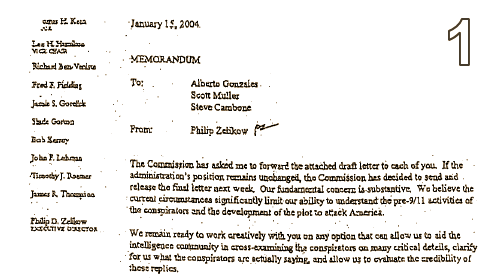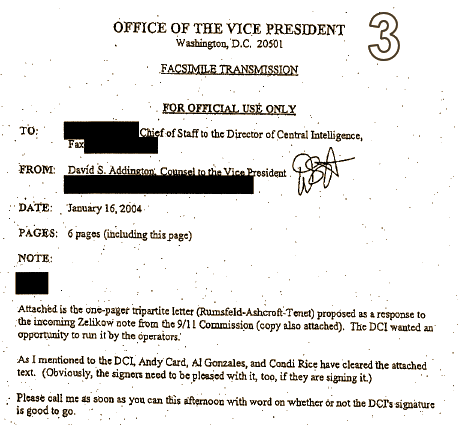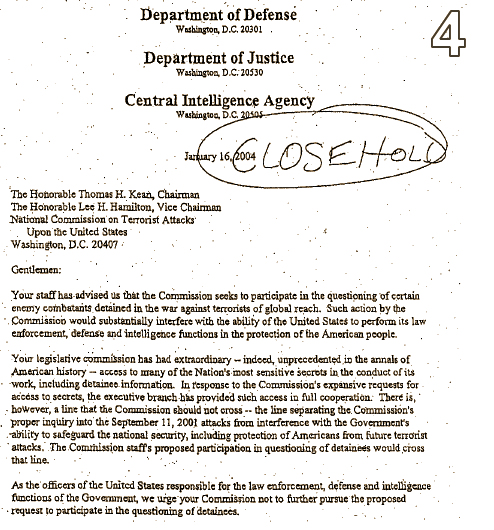Perusing the recent document dump from the CIA, I ran across some 2004 memos that seemed interesting, but I felt I was walking in on the middle of a movie. I was. It was an exchange between the 911 Commission and the Bush Administration – Gonzales [President], Scott Muller [CIA], and Stephen Cambone [DoD]. emptywheel has the background.
Did Addington Oppose 9/11 Commission Questions to Avoid Independent Evaluation of Torture Program?
By emptywheel
March 16, 2010
Shortly after news broke that CIA destroyed the torture tapes, the 9/11 Commission issued a letter complaining that they had not been told of – much less been allowed to review – the torture tapes.
The commission’s mandate was sweeping and it explicitly included the intelligence agencies. But the recent revelations that the C.I.A. destroyed videotaped interrogations of Qaeda operatives leads us to conclude that the agency failed to respond to our lawful requests for information about the 9/11 plot. Those who knew about those videotapes — and did not tell us about them — obstructed our investigation.They released a memo from Philip Zelikow describing how the Administration refused to allow the 9/11 Commission direct access to detainees in early 2004.
The full Commission considered this issue in a meeting on January 5, 2004 and decided the CIA responses were insufficient. It directed the staff to prepare a letter to administration officials that would make the dispute public. There were then discussions between Hamilton and White House counsel Alberto Gonzales and several meetings of CIA lawyers with Commission staff. The Commission offered various compromises to avoid disrupting the interrogation process, including direction or observation of questioning in real-time using one-way glass, adjoining rooms, or similar techniques. In a January 15, 2004 memo to Gonzales, Muller, and Undersecretary of Defense Steve Cambone, Zelikow wrote, “We remain ready to work creatively with you on any option that can allow us to aid the intelligence community in cross-examining the conspriators on many critical details, clarify for us what the conspirators are actually saying, and allow us to evaluate the credibility of these replies.”
But these negotiations made little progress. Hamilton and commissioner Fred Fielding then met with Gonzales, Tenet, Secretary of Defense Rumsfeld, and Chris Wray from the Department of Justice. The administration offered to take sets of written followup questions, pose them to detainees, relay answers back to the Commission, and take further questions. In a January 26, 2004 meeting the Commission accepted this proposal as the best information it could obtain to address its longstanding questions.
The snapshot Marcy references involves four documents in the dump. The first [1] was from Phillip Zelikow, Executive Director of the 9/11 Commission. They were obviously upset about the information they received about the interrogation of the detainees [Note that these memos are from before the Abu Ghraib scandal in September 2004, before we knew about the Torture Program]:

It’s obvious that the Commission had been trying to gain direct access to the detainees to try to understand the lead-up to 9/11, and they’d hit a stone wall. They had obviously gotten the run around from George Tenet. Zelikow’s impatience is palpable. Here’s the letter he was talking about sending [2]:

I don’t know which seven, but I’d guess that the list would contain the people who had been tortured, though that wasn’t yet known. From the letter, one might suspect that they "smelled a rat." Tenet’s reasons don’t sound very convincing, or rational. But then things take a bizarre turn. The response letter is being drafted by David Addington, then the Counsel to the Vice President. Why was the Office of the Vice President involved? We know the answer now, but I’m not sure we knew in January 2004. Torture was the OVP’s "baby." [3]

As you might guess, the answer was "No." [4]

The 911 Commission was appointed to look into the 9/11 attack. It seems only reasonable that they would want access to the detainees – particularly KSM [Khalid Sheikh Mohammed], the "mastermind" of 911. Why wouldn’t they want that? What could it hurt? What secrets? So, they settled for passing written questions and answers back and forth. Addington’s letter is firm with his special flavor of contemptuousness – playing the bully as ever. If you read it several times, it is absurd. emptywheel says:
At the very least, letting Commission staffers view the interrogations would have showed that the interrogators were incompetent at what they were doing [which, Zelikow has made clear, was already becoming apparent from the interrogation reports anyway]. But, too, there was another risk. If Commission staffers saw some of these detainees in person, it would become clear that they weren’t who the Administration claimed them to be.
I’d say it more directly. David Addington and Vice President Cheney didn’t want the 911 Commission to know that these detainees were spread around the world being tortured by the C.I.A. What David Addington was having Donald Rumsfeld, George Tenet, and John Ashcroft sign was a letter that hid the Torture Program behind a bogus claim of National Security. I can think of no other explanation for these documents. The central office for lies was, by this time, the Office of the Vice President of the United States.
On the one hand, it is nauseating to realize that Dick Cheney was deciding that the people had no business in the people’s business…that the members of the 9/11 Commission, charged with and accountable for the propagation of as complete an explanation of the events, could be blown off while the better minds solved the real problems.
On the other hand, that these data are de-classified and publishable even in redacted form seems some sort of testament to the durability and resilience of our systems. Cheney may well escape the hoosegow but he shall not escape the truth.
You know what? I feel that too most of the time – the part about resiliency, about the truth becoming part of history. But I’m still drawn to keeping up with it – like it might disappear or get lost somehow.
“A patriot must always be ready to defend his country against his government.”
Edward Abbey
Edward Abbey was coming from a different direction (pro-environment, anti-industry, anti-war), but this quote could just as well have come from the Tea Party Crowd — especially the idiot who compared them to the Prague uprising against the Czech communist government.
I suppose the difference is in what actions of the government you’re protesting — “takeover of health care” or “ruining the environment.”